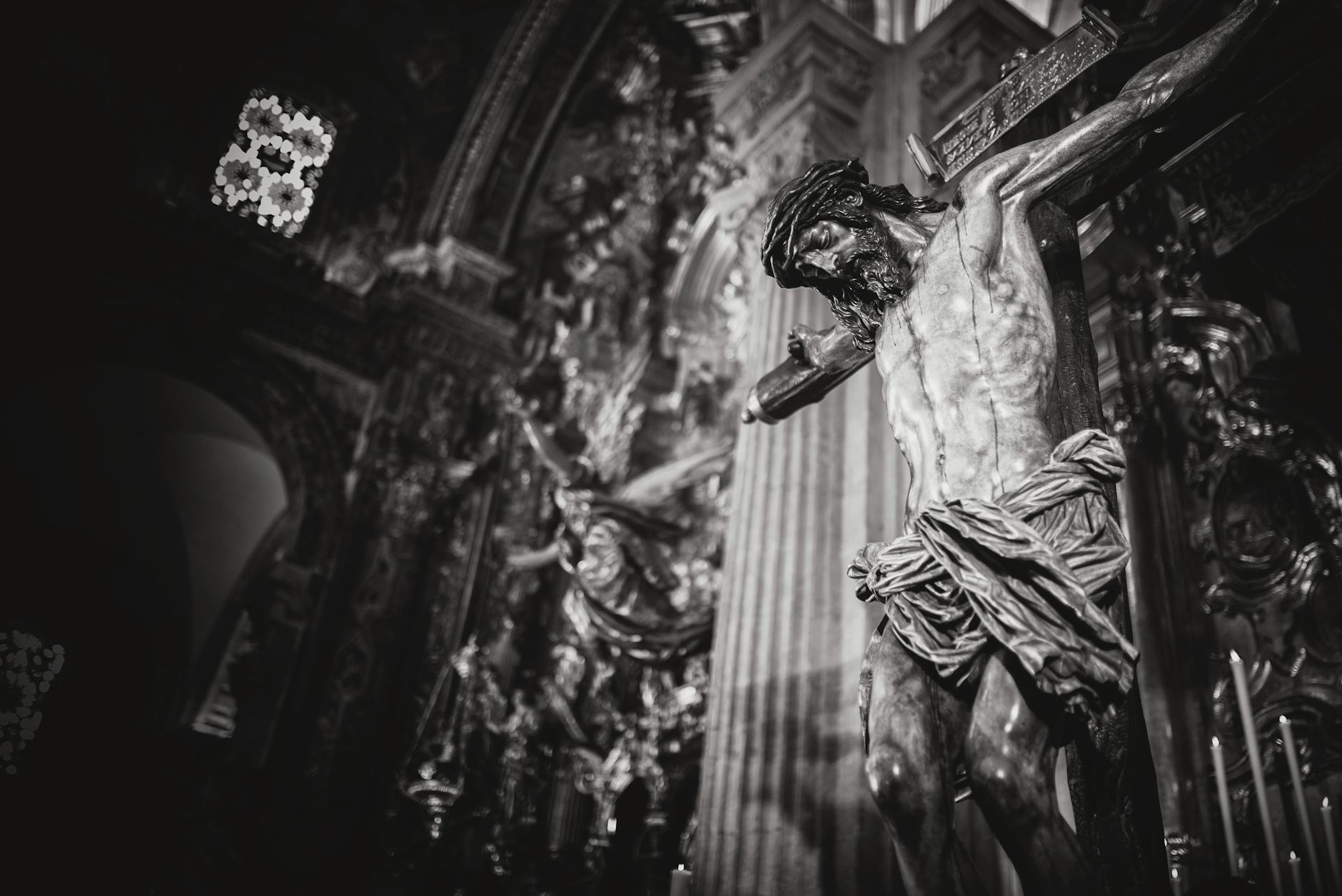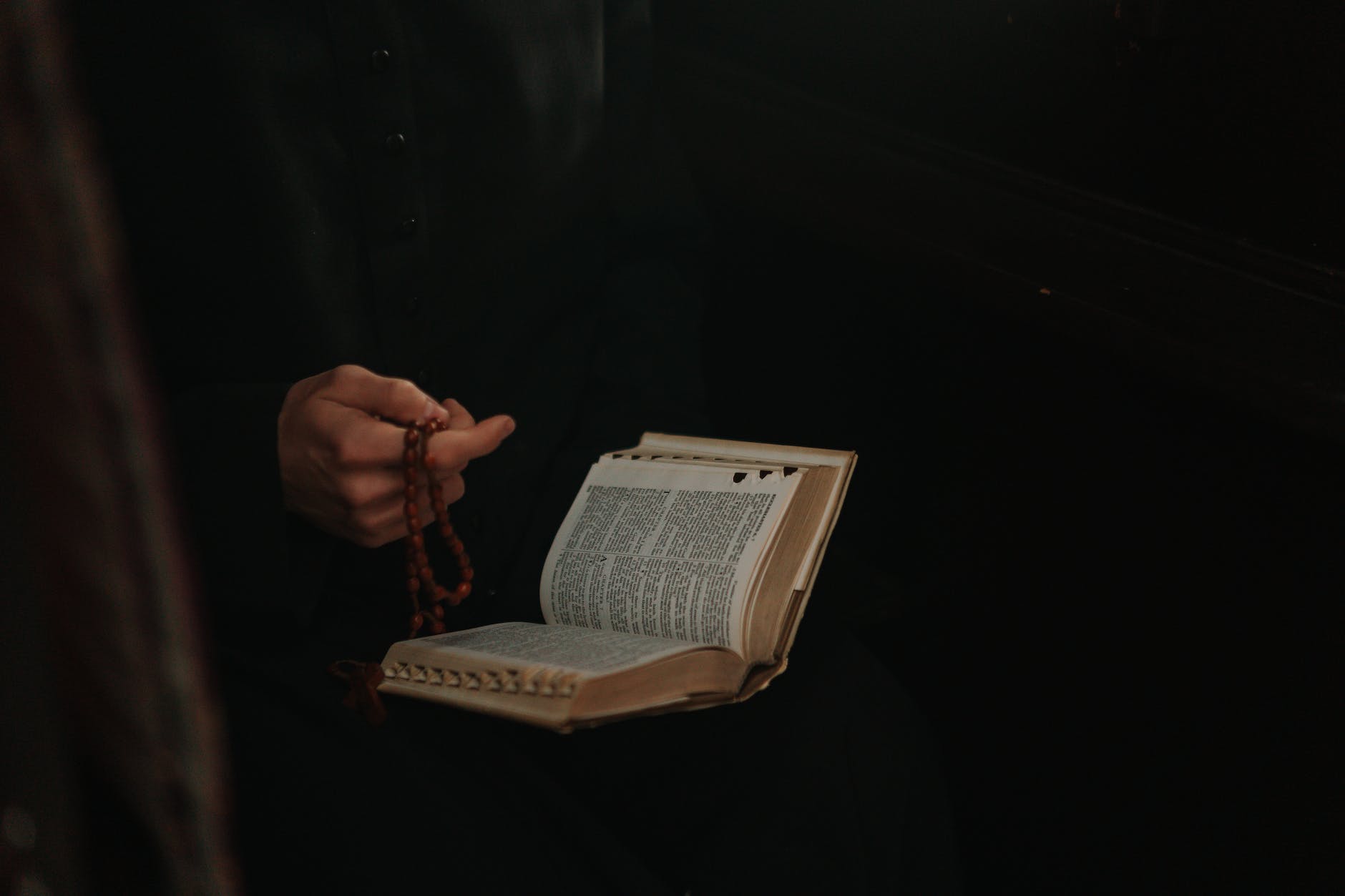A personal tradition of mine on Christmas night after all the hubbub is done, the household is asleep, and the living room is dark, is to settle in a comfortable spot near the lit Christmas tree and pray a sweet rosary. Gently bathed in the multicolored lights of the tree, with something hot to drink, I’m especially comfortable and relaxed. Join me. 🙂
Take me, Lord, to the center of everything, into the mysteries of your Incarnation and Childhood. Take me into Mary’s pondering heart.
If you forgot or don’t know how to pray the rosary, check here. for instructions.
If you don’t have a rosary guess what? God made us with the perfect number of fingers to make do with as a rosary of the moment!
The important thing is to settle down and to pray with attentive love.
So take a few steady breaths. Most likely it’s been a long day hasn’t it? My head is usually swimming at the end of Christmas festivities even if they were nice. My feelings swirl around in me without much definition and I need quiet and solitude with God. Maybe you feel like that too. So take a nice deep breath so you can concentrate now, releasing it slowly. Smile a small smile in a relaxed way. Think of Mary’s joy. She was tired on this night too after all. Let’s relax with her and look at Jesus.
Come, Holy Spirit, come by means of the powerful intercession of the Immaculate Heart of Mary, Thy well- beloved spouse.
Proceed as usual with the Apostle’s Creed, an Our Father, and three Hail Marys in honor of her faith, hope and love that brought us to this moment with the Lord.
First Joyful Mystery: The Annunciation to Mary and the Incarnation of the Lord within her
Mary’s humility was light, natural and free. Real humility is only the truth about ourselves and Mary was grounded and centered in truth. She was free to respond with wonder and love and also to ask for clarification from the Angel Gabriel. “How can this be since I am a virgin?” Once she understood how this would happen, in freedom and with love she accepted. God the Son became a tiny pin point asking for shelter and love and she said yes. It was a quiet thing. And he was there. Maybe she cried. Maybe she smiled. Maybe both.
“To whom God willed to make known what are the riches of the glory of this mystery among the Gentiles, which is Christ in you, the hope of glory.”
Colossians 1:27
The Second Joyful Mystery: The Visitation of Mary to Elizabeth
Mary seems to have gone alone to see her kinswoman Elizabeth. She didn’t hesitate, either. She “went with haste.” Nobody told her to. She seemed to just be drawn there. She must have felt full of the stars God showed Abraham as she hurried to Elizabeth’s, stars bright across the sky, stars in her body, woven in her hair, scatted in her path. I wonder if she felt so astonished and scared and excited that sometimes she ran? Elizabeth heard Mary’s voice calling to her. Nobody told her anything. She just knew. And it seemed the baby she carried knew too. She knew she was in the presence of the Lord and that Mary was her queen. Both women prophesied in joy. The first two Christians, the first two gathered in his Name. God took care of them both through one another. Mary needed understanding, partnership and support, someone to pray with her who was in on the Secret. Elizabeth needed help, companionship and understanding too. They must have had an amazing, as well as joyfully ordinary three months together, leaving both women stronger.
A faithful friend is a sturdy shelter:
[she] that has found one has found a treasure.
There is nothing so precious as a faithful friend,
and no scales can measure [her] excellence.
A faithful friend is an elixir of life;
and those who fear the Lord will find [her].
Sirach 6:14-16
The Nativity of Jesus
None of the women of her family or village were there to help her. Men were not used to being part of the birthing process. But Joseph, surrounded by the kindly witness of the animals who seemed to understand, did his utmost for Mary that night in the dark, in the hay of a stable. Maybe she told him what she needed since she would have seen many births by then, going with her mother to help the other women. Joseph held her close and they prayed, wiping tears from each other’s faces, telling each other “You’re so brave!”
Mary laid the Baby in a feeding trough after his first nursing and after wrapping him in swaddling cloth she had brought with her, while Joseph cleaned up and brought her water. Then they would have placed the baby between them and slept, waking to feed him, to gently laugh and touch his soft little head wondering what was going to happen now as beyond the stable the rising star of Bethlehem shone out to the three wise men on their travels, and the angels sang to the shepherds in the fields filling the sky and their hearts with awe and joy.
The Word became flesh and made his dwelling among us. We have seen his glory, the glory of the one and only Son, coming from the Father, full of grace and truth.
John 1:14
The Presentation of the Baby Jesus in the Temple
Oh no this was not what she thought she would hear at all; that Jesus would be rejected? That her heart would be pierced with a sword? What did it mean? The Angel had not said this. But Simeon had recognized him. She and Joseph had listened astonished as the old man blessed God and declared he could go in peace because he had seen the Savior as God had promised him. The prophetess Ana had known him too, had spoken about him. What is this God was telling them!? Joseph was worried because Simeon hadn’t said anything about him which made him think Mary and Jesus would face this calamity alone and it broke his heart. But Joseph and Mary were brave young people, full of love and determination. They discussed Simeon’s words on their way home. What would they do? Maybe Joseph said that there was only one thing to do: to love Jesus and each other, and to go on knowing they would walk with him as far as the Lord allowed. Mary squeezed his hand. “After all,” she said, “what else is there?” “God is it,” Joseph said. “God is it and that’s it.”
I say to the LORD,
you are my Lord,
you are my only good.
Psalm 16:2
The Finding of the Child Jesus in the Temple
“Mary, please try to eat,” Joseph pleaded. “Maybe you should sleep,” she said. “Maybe you will have one of your dreams.” But there was no sign, and no one knew where Jesus was. They prayed as they walked and searched with growing desperation, calling his name.
Finally they found him in the Temple. Mary interrupted the questions of the teachers of the law to embrace her Son. “Why have you done this to us? We have been looking for you everywhere!” Jesus was surprised. “Didn’t you know I would be here in my Father’s house?” The teachers were telling Joseph how amazed they had been to hear the uncanny wisdom of his child. Jospeh and Mary weren’t sure what was going on. But Jesus went home with them and kept growing, learning, and loving them, and they loved him back.
Maybe you feel like you have lost Jesus. Maybe you can’t find him and be with him the way you used to. But he is there in the Temple of your heart and you will find him again.
Do you not realize that Christ Jesus is in you?
Corinthians 13:5
Now imagine yourself with Mary. She is there with you, smiling gently, looking at you expectantly. Take her hand and pray the Hail Holy Queen. Add some words of your own. Maybe you would like to say, “Thank you Mother Mary. Thank you for all that you did to bring us Jesus and to be with us on our way.” Wish her a Merry Christmas. 🙂 Merry Christmas Mother Mary. And happy birthday, Lord. Happy birthday to you.






































